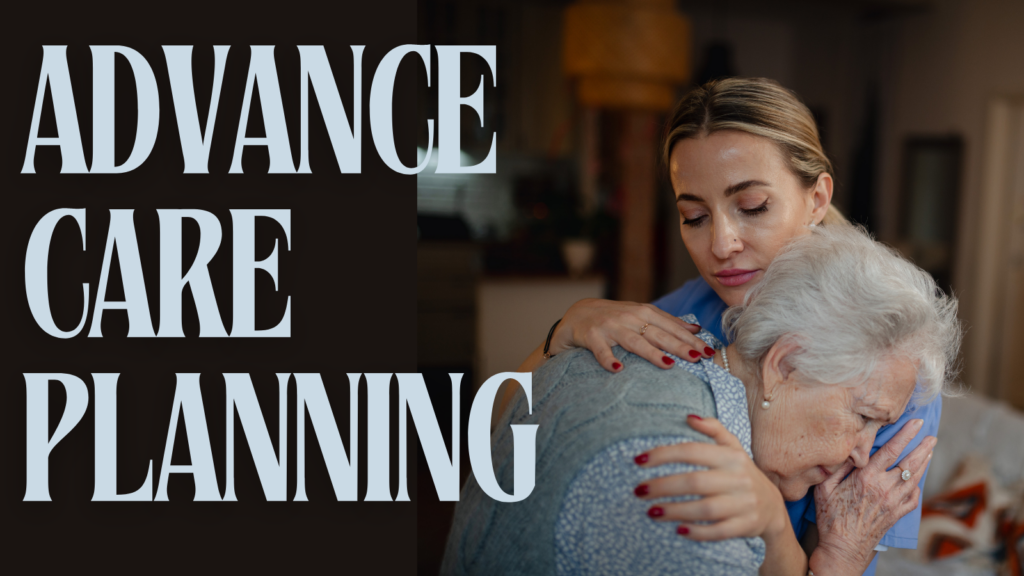
Advance care planning is a voluntary process that involves helping people to plan and express for their future care and support needs, including medical treatment, and therefore to exercise their personal autonomy as far as possible. This should be offered to everyone who is at risk of losing capacity (for example through progressive illness), as well as those who have fluctuating capacity (for example through mental illness).
Some approaches involve the production of legally binding advance decisions, which only cover decisions to refuse medical treatment, or the appointment of an attorney.
Advance statement about your care wishes
An advance statement is a written statement that sets down your preferences, wishes, beliefs and values regarding your future care. The aim is to provide a guide to anyone who might have to make decisions in your best interest if you have lost the ability to make or communicate decisions.
What does an advance statement cover?
An advance statement can cover any aspect of your future health or social care. This could include:
- how you want any religious or spiritual beliefs to be reflected in your care
- where you would like to be cared for, for example at home or in a hospital, a nursing home, or a hospice
- how you like to do things, for example if you prefer a shower instead of a bath, or like to sleep with the light on
- practical issues, for example who will look after your dog if you become ill
You can make sure people know about your wishes by talking about them. (e.g., “I’d prefer to avoid aggressive treatments if they won’t improve my quality of life”). By writing your advance statement down, you can help to make things clear to your family, carers and anybody involved in your care. You can write it with support from relatives, carers, or health and social care professionals.
Is an advance statement the same as an advance decision?
No. An advance decision (also known as a living will, or advance decision to refuse treatment) is a decision you can make now to refuse specific treatments in the future. An advance decision is legally binding, as long as it meets certain criteria. Read more about advance decisions to refuse treatment
An advance care plan can cover areas such as the person’s thoughts on different types of care, support or treatment, financial matters, and how they like to do things (for example shower rather than bath). People using health and social care services who may (now or in the future) lack mental capacity to make specific decisions, as well as their families, friends, carers and other interested parties. As part of this process:
- Together with the person (and their carer or family if they wish), think about anything that could stop them being fully involved and how to make their involvement easier.
- Take into account the person’s: history, social circumstances, wishes and feelings, beliefs, including religious, cultural factors, aspirations, and any other factors they feel are important.
- The person may need help to communicate during these discussions.
Advance decisions to refuse treatment:
An advance decision to refuse treatment (sometimes referred to as a living will and sometimes abbreviated to ADRT) is a decision an individual can make when they have capacity to refuse a specific type of treatment, to apply at some time in the future when they have lost capacity. It means that families and health professionals will know the person’s decisions about refusing treatment if they are unable to make or communicate the decisions themselves.
An advance decision must be valid and applicable before it can be legally binding. For example, one of the conditions is that the individual is aged 18 or over at the time the decision is made. To establish whether an advance decision to refuse treatment is valid and applicable, practitioners must have regard to sections 24 to 26 of the Mental Capacity Act 2005. If the advance decision purports to refuse life-sustaining treatment, additional requirements apply. (See Chapter 9 of the Mental Capacity Act Code of Practice.)
Lasting Power of Attorney:
A legal instrument that allows a person (the ‘donor’) to appoint one or more people (known as ‘attorneys’) to make decisions on their behalf.
There are 2 types: health and welfare, and property and financial affairs, and either one or both of these can be made.
- Giving someone power of attorney means that you give another person the right to make decisions about your care and welfare. This is called a health and welfare LPA.
- To have legal force, lasting powers of attorney must be created in accordance with section 9 and section 10 of the Mental Capacity Act 2005.
- The attorney must have regard to section 4 of the Mental Capacity Act 2005, the Mental Capacity Act Code of Practice, and must make decisions in the best interests of the person.
Planning ahead:
Planning things like what type of funeral you want and who to leave your belongings to can make your final days easier, giving you more time with family and friends. Planning Ahead -What matters most to you? https://advancecareplanning.org.uk/planning-ahead There may be many decisions to make about the way you live your life now and in the future. This tool is only about decisions that affect your medical care priorities. It includes some of the choices some people need to make about treatment and care at the end of life. It will help your loved ones if you have already thought about some of these decisions and let them know what matters most to you.
Further information:
- Decision-making and mental capacity – NICE guideline, including implementation resource
- Mental Capacity Act Code of Practice – available from Office of the Public Guardian
- Advance Care Planning: A Guide for Health and Social Care Staff (PDF) – University of Nottingham. Includes more information on lasting power of attorney
and advance decisions. - Planning for your future care: a guide (PDF) – NCPC/University of Nottingham/National
End of Life Care Programme. An information source for people considering advance
care planning. - My future wishes: Advance care planning for people with dementia in all care settings – NHS England
- Advance planning and decision-making – SCIE
- Advance decisions to refuse treatment – NCPQSW, Bournemouth University
- Age UK: Advance decisions, advance statements and living wills (PDF: 436kb)
- Alzheimer’s Society: Advance statements and dementia
- Cancer Research UK: Advance care planning
- Compassion in Dying: How we can help
- GOV.UK – make, register or end a lasting power of attorney
- GOV.UK – lasting power of attorney: health and welfare attorneys
- GOV.UK – lasting power of attorney: property and financial affairs attorneys
- https://www.hospiceuk.org/information-and-support
- https://www.hospiceuk.org/hospice-care-finder Looking for a hospice? Hospice Finder shows you adult and children’s hospices near you.
